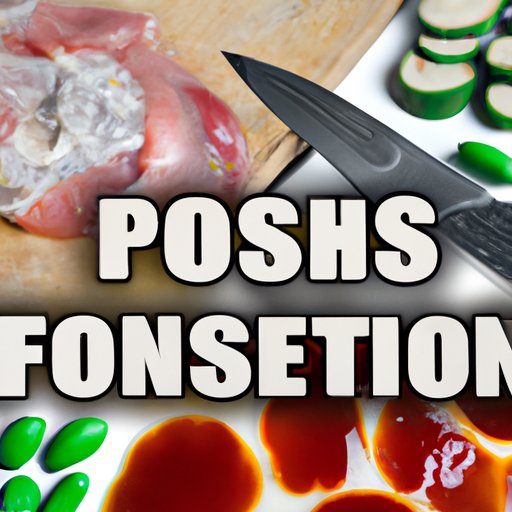
Introduction
Food poisoning is a common issue that affects millions of people across the globe every year. This illness occurs when an individual consumes contaminated food that contains harmful bacteria, viruses, or parasites. Often, this leads to various symptoms that can range from mild to severe depending on the severity of the infection.
Can Food Poisoning Cause Fever?
One common question that people have when it comes to food poisoning is, “Can food poisoning cause a fever?” The straightforward answer is yes. A fever is a common symptom that often accompanies the onset of food poisoning. In many cases, it is a natural defense mechanism that your body uses to combat the harmful bacteria or viruses in your system and prevent infections from spreading.
However, not everyone with food poisoning will develop a fever. This often depends on a number of factors, such as the severity of the infection and your overall health and immune system.
Types of Food Poisoning and Their Effect on Fever
While fever can occur with any form of food poisoning, some types of these infections are more likely to cause a fever than others. For instance, Salmonella is a type of bacteria that can cause high fevers, along with other symptoms such as diarrhea, vomiting, and abdominal cramps.
Other types of food poisoning may not cause a fever, but instead, lead to different symptoms such as nausea, headache, and fatigue.
Risk Factors for Developing Fever from Food Poisoning
Several factors can increase your risk of developing a fever when suffering from food poisoning. One major factor is having a weakened immune system, such as those with pre-existing health conditions or undergoing chemotherapy or taking certain medications. Older adults are also more susceptible to developing fevers from food poisoning as their immune systems tend to be weaker.
The extent of food contamination is another significant factor that can impact the severity of food poisoning symptoms. In many cases, the degree of contamination will determine the type of bacteria or virus present, affecting the severity of the infection.
Prevention Measures
Reducing your risk of food poisoning is key to avoiding potential complications such as fever. Safe food handling strategies should always be followed, including washing hands, surfaces, and utensils regularly, cooking food to the correct temperature, and refraining from cross-contaminating cooked and uncooked food.
Proper food storage is also essential to prevent the growth of harmful bacteria and viruses. Foods that are more prone to contamination should be handled carefully, including fruits, vegetables, and raw meats. Additionally, it is crucial to avoid consuming expired or damaged food and always ensure that your food is properly cooked before consumption.
Managing Symptoms of Food Poisoning
If you do develop food poisoning, managing symptoms such as fever can be crucial to your recovery. Over-the-counter medications such as acetaminophen or ibuprofen can be helpful in reducing fever and providing relief from other symptoms such as headaches and muscle aches.
Home remedies such as consuming probiotics or drinking clear fluids can also help alleviate symptoms like nausea and vomiting. Rest and hydration are also essential to recovery from food poisoning, and self-help strategies such as getting enough rest, staying hydrated, and avoiding fatty or spicy foods can help prevent worsening of the symptoms.
Potential Long-term Effects of Food Poisoning
While most mild cases of food poisoning will resolve themselves within a few days, some cases may lead to long-term effects. These can include ongoing fatigue, headaches, and joint pain. People with weakened immune systems, and more severe cases of food poisoning, are more likely to experience ongoing symptoms post-infection.
Real-life Cases
The risk of food contamination highlights the potential long-term consequences of eating contaminated food. For example, in 2011, the Listeria outbreak in Colorado led to 147 individuals being hospitalized, with 33 deaths reported, as a result of contaminated cantaloupes. This tragic event underscores the importance of food safety and handling procedures to prevent the spread of harmful bacteria.
Conclusion
Food poisoning is a serious issue that can cause a range of symptoms, including fever. While not everyone will develop fever when infected with harmful bacteria or viruses, it is essential to take preventive measures and symptoms seriously. Safe food handling strategies and proper food storage practices are key to avoiding infections, and if you suspect that you have food poisoning, seeking medical attention is crucial to a full recovery.




